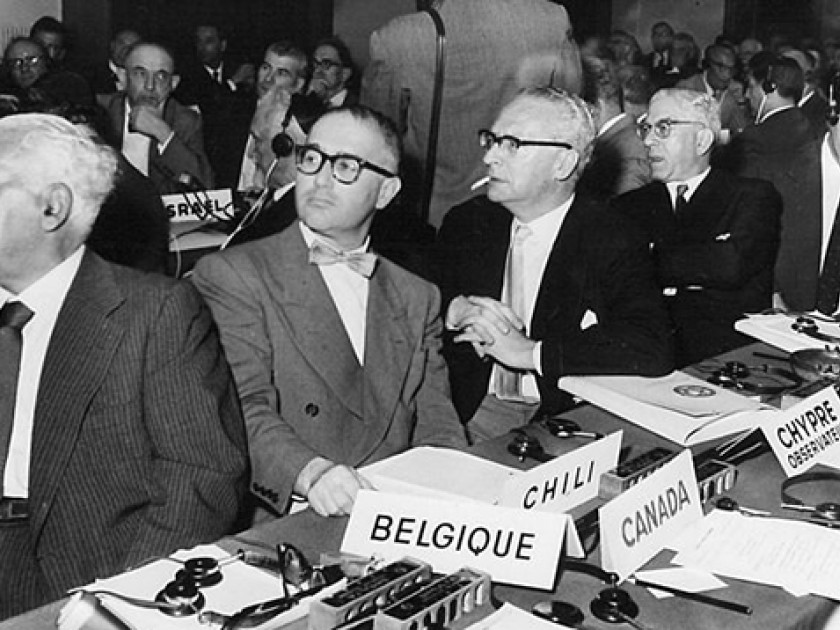
Header photo credited to The World Jewish Congress.
Menachem Z. Rosensaft, editor of The World Jewish Congress, 1936 – 2016, has been guest blogging for the Jewish Book Council this week as part of the Visiting Scribes series.
Our goal was for The World Jewish Congress, 1936 – 2016 to faithfully depict the contributions and achievements of the WJC’s leaders over the course of the past 80 years, including in addition to Ambassador Lauder the WJC’s founders Rabbi Stephen S. Wise and Dr. Nahum Goldmann, its longtime secretary-general Gerhart M. Riegner, and its president from 1981 to 2007, Edgar M. Bronfman.
In the interest of full disclosure, a brief personal note seems appropriate. I am not a totally disinterested observer of many of the events and individuals described in the pages of The World Jewish Congress, 1936 – 2016. My father, Josef Rosensaft, worked closely with many of the leaders of the WJC between 1945 and 1950 in his double capacity as chairman of the Central Committee of Liberated Jews in the British Zone of Germany and the Jewish Committee that administered the Bergen-Belsen Displaced Persons camp. During those years he developed what proved to be life-long friendships with Goldmann, Riegner, and numerous other other WJC leaders. As a result, I grew up knowing many of these WJC personalities and became aware of the organization’s activities in the international Jewish arena almost by osmosis. Decades later, I ran an international foundation for Ambassador Lauder from 1995 to 2000, and since 2009, as the WJC’s general counsel, I have worked closely with Ambassador Lauder, CEO Robert Singer, Secretary-General Emeritus Michael Schneider, Chief Program Officer Sonia Gomes de Mesquita, and the entire senior lay and professional WJC leadership.
Among the contributors to The World Jewish Congress, 1936 – 2016 who share their personal experiences and perspectives are Monsignor Pier Francesco Fumagalli, vice prefect of the Biblioteca Ambrosiana in Milan, who recalls the WJC’s pioneering role in crafting a new Catholic-Jewish relationship; Gregg J. Rickman, who led the US Senate Banking Committee’s examination of Swiss banks and their treatment of Holocaust-era assets during and after World War II and who depicts the WJC’s key role in forcing Swiss banks to disgorge more than one billion dollars they had wrongfully withheld from Jewish Holocaust victims and their heirs; Eli Rosenbaum, the longtime head of the US Justice Department’s Office of Special Investigations, who as my predecessor as the WJC’s general counsel oversaw the WJC’s exposure of Kurt Waldheim’s Nazi past; Natan Lerner, professor of law emeritus at IDC Herzliya, the director of the WJC’s Israel Branch from 1966 until 1984, who writes about the WJC’s relationship and interactions with the State of Israel; Evelyn Sommer, chairperson of the WJC’s North American Section, who was instrumental in the campaign to rescind the UN resolution equating Zionism with racism; and Maram Stern, the WJC’s deputy CEO for diplomacy, who reminisces about the complexities of attempting to maintain relations with Jewish communities in Communist countries during the Cold War years.
Other chapters in The World Jewish Congress, 1936 – 2016 are devoted to, among other topics, the invaluable assistance the WJC provided to the prosecutors at the International Military Tribunal at Nuremberg, and the organization’s successful diplomatic negotiations on behalf of Jews from North Africa in the 1950s and 1960s. In the book’s concluding chapters, Ambassador Lauder lays out his vision of the Jewish future, and Robert Singer describes the activities and accomplishments of the World Jewish Congress today.
I am deeply honored that Ambassador Lauder and Robert Singer entrusted me with the task of compiling and editing this book, and am grateful to them for their constant encouragement and support. It is our hope that The World Jewish Congress, 1936 – 2016 will become an essential resource not just for an understanding of the World Jewish Congress, but for anyone interested in Jewish political history of the twentieth and early twenty-first centuries.